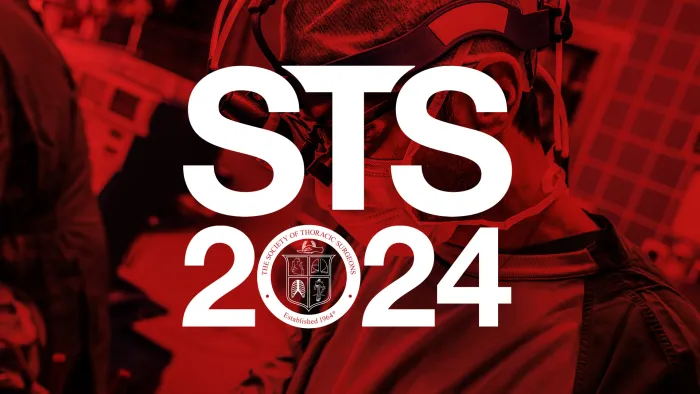A scientific session devoted to identifying and closing gaps in health care will take place on Saturday at STS 2023.
The session, beginning at 2:45 p.m. PT on January 21, will highlight evidence-proven programs that have not only identified disparities in health screening and treatment, but have successfully improved care for patients regardless of demographics, emphasized moderator Cherie P. Erkmen, MD, director of the lung screening and thoracic surgery residency programs for the Lewis Katz School of Medicine at Temple University in Philadelphia, Pennsylvania.
Dr. Erkmen said, “One of the things we struggle against in the realm of diversity, equity, and inclusion is that people are tired of just hearing, ‘There’s disparity, there’s inequity, there’s a problem.’ But then—what do we do? That’s part of the focus of this session—health equity in practice and people who have embraced it, successfully increasing their volumes and improving patient outcomes.”
Assembled by Dr. Erkmen and Sara Pereira, MD, from the University of Utah Health, presentations within the Symposium include a report on gender outcomes in coronary bypass grafting, racial disparities in the inpatient management of ischemic heart disease, increasing health equity in the heart and lung transplant arenas, mitigating disparities across the lifetimes of patients who have undergone congenital cardiac surgery, and strategies to improve adherence to lung cancer screening guidelines in underserved communities, based on researchers’ experience in rural South Carolina.
“Dr. Tara Karamlou has examined the entire continuum of congenital cardiac surgery, from diagnosis through adulthood, and has opened her doors to understand a very challenging population,” Dr. Erkmen explained. “Dr. Yoshiya Toyoda is a transplant surgeon at a very underserved, ‘safety net’ hospital, yet he’s the number one lung transplanter in the country for several years straight, accepting people across the whole socioeconomic spectrum.”
“We have a thoracic surgeon, Dr. Ian Bostock, who’s looking at diversity in lung cancer screening—understanding where the disparities lie and lowering the barriers to screening so that they can get through the door and to the next step, which is lung cancer treatment,” Dr. Erkmen continued. “The last speaker, Dr. Martha McGilvray, has been awarded the podium for her research on racial disparities in the management of ischemic heart disease.”
Stepping in as co-moderator is Clauden Louis, MD, MS, from Brigham and Women’s Hospital in Boston, Massachusetts.
“I’m excited to be considered to represent such a name—the story of Vivien Thomas is incredibly important,” Dr. Louis said. “I think STS is taking a stand toward valuing our patients and valuing representation, understanding that outcomes are improved when the people taking care of you also have an understanding or a similarity, and are able to represent the population.”
The session is named for Vivien T. Thomas, a Black laboratory supervisor who worked with famed physician Alfred Blalock, MD, at Vanderbilt University in the 1940s. When Johns Hopkins recruited Dr. Blalock, he refused to move unless Thomas accompanied him as a “package deal.” Thomas worked as part of Dr. Blalock's surgical team, helping develop the procedure used in the landmark 1944 "blue baby" operation. Despite his integral role in Dr. Blalock’s pioneering work, Thomas was hired and paid as a janitor and was not allowed to use the main entrance to Johns Hopkins.
“He’s someone who could’ve been me,” Dr. Louis said.
In addition to the Symposium, the third annual Vivien T. Thomas Lecture will take place at STS 2023. This year, the lecture is presented by Francisco G. Cigarroa, MD, and will mark the commencement of the annual meeting on Saturday morning at 8:00 a.m.
“I’m excited about getting interest and participation from our thoracic surgery residents and our junior faculty,” Dr. Erkmen said. “And it's also important for people to know that there is an enduring workforce from the STS headed up by Dr. David Tom Cooke. Under his steady leadership, we've been able to accomplish many, many additions to the cardiothoracic surgery community, including workforce publications, looking at workforce disparity and health disparity, and also coordinating with other committees to make sure that diversity is always in mind as we legislate ourselves and create a program like the STS Annual Meeting.”
On Monday at STS 2023, Dr. Erkmen also will present “The Cost of Being a Woman in Academic Surgery,” a session that analyzes rank and salary throughout women surgeons’ careers and demonstrates the additional hurdles they face.
“We know that there is a difference in care when you are focused on the end goal—better access for everyone,” Dr. Louis said. “I’m excited to represent Dr. Vivien Thomas as a moderator for this session. And I’m excited to meet my colleagues in San Diego.”
STS is still accepting registrations for the annual meeting, offering both an in-person experience and a virtual option, Plenary Livestream-Plus, which allows registrants to stream select meeting content and plenary sessions—including the Thomas Lecture—from anywhere in the world. STS 2023 is the premier forum for presenting new science, techniques, and technology in cardiothoracic surgery. Learn more at STS.org/AnnualMeeting.
